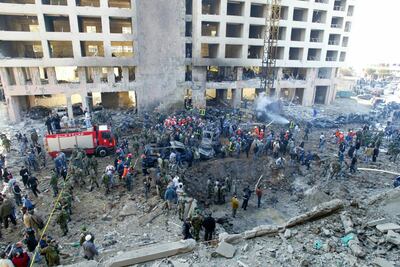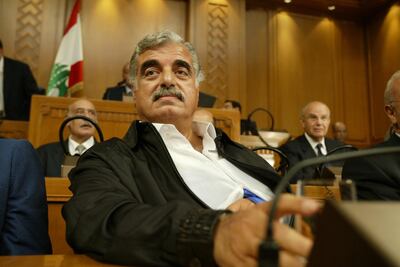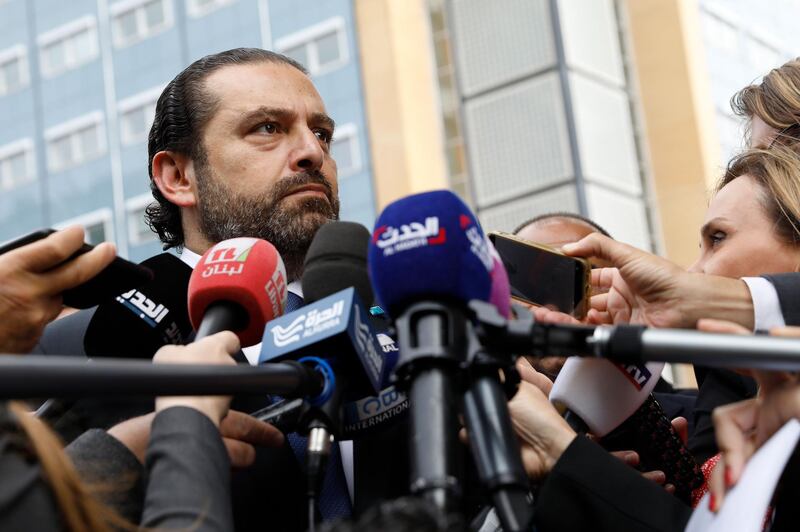Lebanon’s prime minister-designate Saad Hariri promised that his father’s killers would face justice “sooner or later” after appearing at an international tribunal into his assassination on Tuesday.
The killing of former prime minister Rafiq Hariri and of 21 bystanders with a lorry bomb in central Beirut in 2005 marked a turning point in Lebanon’s modern history, causing ruptures that persist to this day.
The Special Tribunal for Lebanon was established in 2009 to prosecute the perpetrators of the attack, and has divided the country ever since. It has indicted five Hezbollah members since 2011 for organising and carrying out the assassination. One of the indictments was withdrawn after the suspect died.
"There is no doubt that this day is difficult for me, as the son of Rafiq Hariri,” Mr Hariri told reporters outside the proceedings in The Hague.
"We are holding on to the truth, to know who is behind the assassination of Rafiq Hariri and all the martyrs who fell defending Lebanon. With justice, the killer will be handed his punishment,” he said earlier.
Mr Hariri was present in court for introductory remarks in the prosecution’s closing arguments to the trial. A verdict is not expected for months.
Saad Hariri, Clemence Tarraf and Ihsan Fayed. Son, sister and wife of deceased persons in the attack of February 14, 2005 are attending the closing arguments today in the Courtroom. pic.twitter.com/6izPfJcdxP
— Special Tribunal for Lebanon (@STLebanon) September 11, 2018
Since its inception, the tribunal has cast a long shadow over Lebanon’s fragile politics. The trial was seen as the first attempt to bring to justice the perpetrators of political violence in a country in which dozens of assassinations and targeted killings have taken placed over the years. But to its detractors, it is a conspiracy and a western plot to destabilise Hezbollah and its allies Iran and Syria.
The killing is widely thought to have been linked to Hariri's opposition to Syria, which occupied Lebanon at the time and with whom he had fallen out of favour.
The assassination of Hariri, a figurehead in the Sunni community, provoked mass protests against the Syrian presence in Lebanon. They came to be known as the Cedar Revolution, and eventually forced Damascus to withdraw its troops.
Mr Hariri looked sombre in the courtroom on Tuesday as he listened to Nigel Povoas, counsel for the prosecution, describe the aftermath of the attack that killed his father.
“The scene was plunged into darkness and utter horror. Lebanon itself was plunged into darkness and horror,” Mr Povoas told the court.
“That is exactly what was intended by the attack. The targeting of a political figure of such eminence and stature, and the sheer magnitude of the explosion in the middle of Beirut, in the middle of the day, was calculated to send a message of terror,” he said.
Outlining a motive, he said Hariri was “perceived of as being a proxy of western interests who would harness his political power to win elections, form a majority and upset the status quo by loosening the grip of the Syrian regime on Lebanon”.

The events that followed Hariri’s assassination solidified Lebanon’s political camps into groupings that were largely defined by their relationship to Syria: the March 14 alliance, led by Saad Hariri’s Future Movement and named for the day of the largest protest against the Syrian occupation; and the March 8 alliance, originally led by Hezbollah and the Amal movement.
The suspects — Salim Jamil Ayyash, Mustafa Badreddine, Hussein Hassan Oneissi and Assad Hassan Sabra, who were indicted in 2011, and Hassan Merhi, indicted in 2013 — have never been arrested or have addressed the court.
Proceedings against Badreddine, believed to have been the mastermind, were dropped after he was killed in Syria in 2016. The whereabouts of the other men are unknown.
Mr Povoas said evidence against the men constituted a “compelling and coherent picture of their guilt”.
In its final brief, the Prosecution states that Ayyash, Merhi, Oneissi, and Sabra are criminally responsible for their conduct of preparing, executing, and supporting the terrorist attack #Ayyashetal
— Special Tribunal for Lebanon (@STLebanon) September 11, 2018
The prosecution’s case has largely been built on telecoms data. They say it shows the location of the suspects during the planning phase of the assassination as they trailed Hariri in the weeks and months before his killing.

The defence teams, unable to speak to their clients or provide alibis, have largely built their rebuttal on questioning the accuracy of the telecoms data and arguing the evidence is mainly circumstantial.
A number of investigators, who worked on collecting evidence, were targeted and killed even before the tribunal was established.
Thirty-one-year-old Major Wissam Eid was credited with playing a key part in uncovering telecommunications data related to the killing. He was assassinated in January 2008 by a bomb planted in a parked car on a highway in east Beirut.
Over the past nine years, the tribunal has heard from more than 300 witnesses, seen more than 3,000 exhibits and more than 144,000 pages of written evidence.
After tumultuous early days in which the tribunal was the most contentious topic in Lebanon, proceedings rumbled on quietly in the background. But its re-emergence today as it nears conclusion comes at a difficult time for the country and the region.
Lebanon is currently gridlocked and without a government as its political leaders squabble over the assignment of cabinet posts. The Middle East as a whole has been transformed since 2009, with Syrian President Bashar Al Assad — who is believed to have ordered the killing — having fought and largely won a devastating civil war in his country.
The Syrian war has become a major dividing line in Lebanon, but the tribunal still has the potential to complicate things.
Speaking last month, Hezbollah leader Hassan Nasrallah accused his political rivals of using the tribunal to put pressure on the group, and issued a stern warning.
“Some March 14 circles are saying that the main reason behind delaying the formation of the government is that the Special Tribunal for Lebanon will issue its ruling in September and that there will be a new situation in the country to capitalise on,” he said.
“The STL does not mean anything to us at all and its rulings are of no value regardless whether they are condemnation or acquittal rulings. To those betting on the tribunal: do not play with fire. Period.”
______________
Read more on STL:
Lebanon's Special Tribunal was supposed to represent an end to impunity for crimes
Aftermath of former Lebanon security chief's combative special tribunal testimony
Probe into Hariri’s assassination to focus on Al Assad
______________
Mr Hariri has had to play a difficult role in the years since his father’s death. He immediately assumed his father’s role as the political leader of Lebanon’s Sunni community, and has walked a turbulent path ever since.
During his first term as prime minister in 2009, he visited Damascus to meet President Assad in an attempt to repair ties between Lebanon and Syria. He did so before any indictments were issued by the tribunal, but when Syria was strongly suspected of having ordered the killing.
On Tuesday, he promised to put his personal feelings about the case aside.
“I want to deal with this issue as a responsible official who has the responsibility to protect the country and the Lebanese people,” he said.
Sami Nader, director of Levant Institute for Strategic Affairs, said although the tribunal has divided the Lebanese, it could serve as a deterrent against future political violence.
“It used to be the habit in Lebanon to eliminate your political opponent — if you don’t agree with someone you kill them. This tribunal may make people think twice before doing such a thing again.”
Mr Nader said that any impact on Hezbollah would be to its image rather than to its political or economic strength.
“I believe that this will have a moral impact on Hezbollah, not more than that, because it’s already under sanctions for different reasons.”
But Dr Darina Saliba Abi Chedid, professor of public international law at the Lebanese American University, said any verdict that implicated Hezbollah risked a row between the Lebanese government and the international community.
“Hezbollah is legitimately represented in Lebanon’s political institutions, and any attempt to target the group by the international community could cause a crisis over its role in government,” she said.
Richard Hall reported from Beirut





